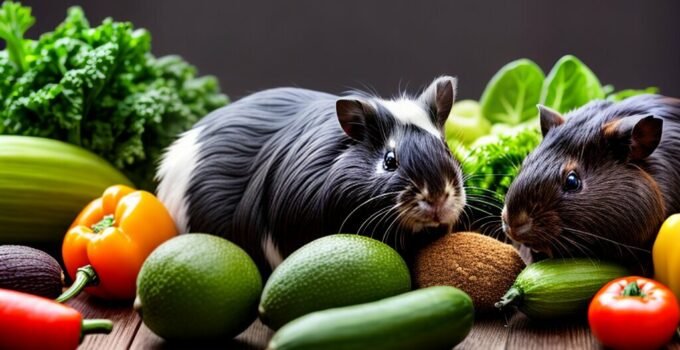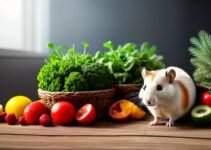Pet guinea pigs, like other animals, require a proper diet to maintain good health and well-being. One crucial aspect of their diet is the inclusion of vegetables, which provide essential nutrients and support their digestive system. Offering a variety of vegetables not only adds an exciting change to their diet but also ensures that their nutritional needs are met.
In this article, we will explore the healthiest vegetables for pet guinea pigs and their benefits. We will also discuss how to introduce vegetables into their diets and potential health issues to watch out for. Let’s dive in!
Key Takeaways:
Vegetables are an essential component of a guinea pig’s diet.
A well-balanced diet helps maintain optimal health and well-being.
Incorporating a variety of vegetables supports their nutritional needs and digestive system.
Why a Balanced Diet is Important for Guinea Pigs
Guinea pigs are adorable and popular pets that require a balanced and nutritious diet to stay healthy. A balanced diet ensures that guinea pigs receive the essential nutrients they need to maintain their overall well-being, healthy weight, and optimal growth.
Guinea pigs are herbivores that require high amounts of fiber in their diet to support their digestive system. They also need vitamin C, which they cannot synthesize on their own and must be obtained through their diet. An inadequate or imbalanced diet can result in various health issues like dental problems, obesity, and weakened immune systems.
Vegetables play a crucial role in providing guinea pigs with the nutrients they need. In addition to fiber and vitamin C, vegetables contain essential vitamins and minerals that support their immune system and overall health.
Owners should ensure that guinea pigs receive a balanced diet that includes a variety of vegetables. The right amount and combination of vegetables can provide guinea pigs with the necessary nutrients for optimal health and well-being.
The Benefits of Vegetables for Guinea Pigs
Vegetables play a crucial role in a guinea pig’s diet, providing them with essential nutrients that contribute to their overall health and well-being. Here are some of the benefits that vegetables offer:
| Benefit | Vegetables |
|---|---|
| High fiber content | Spinach, kale, cilantro |
| Hydration properties | Cucumbers, lettuce, zucchini |
| Essential vitamins | Carrots, bell peppers, broccoli |
| Key minerals | Radishes, turnips, cauliflower |
Moreover, vegetables promote healthy digestion in guinea pigs, improve their immune system, and support their dental health. It is essential to note that vegetables should be fed in moderation and as part of a balanced diet, along with hay and pellets.
The Benefits of Vegetables for Guinea Pigs:
1. High Fiber Content: Vegetables like spinach, kale, and cilantro are high in fiber, which helps to prevent digestive problems such as constipation and diarrhea. Including these vegetables in their diet can help to keep their digestive tract healthy, ensuring efficient processing of food.
2. Hydration Properties: Vegetables like cucumbers, lettuce, and zucchini have high water content, contributing to the hydration needs of guinea pigs. Hydration is crucial in maintaining the health of their urinary tract.
3. Essential Vitamins: Vegetables such as carrots, bell peppers, and broccoli are rich in vitamins A and C, which are essential for guinea pig’s overall health, vision, and immune system.
4. Key Minerals: Radishes, turnips, and cauliflower are excellent sources of important minerals such as potassium, magnesium, and calcium, which contribute to guinea pigs’ bone and muscle health.
Feeding vegetables to guinea pigs is a great way to provide them with essential nutrients. However, it is critical to introduce them gradually to avoid digestive problems and to monitor their reactions to specific vegetables. Overall, vegetables are a healthy addition to a guinea pig’s diet, contributing to their overall well-being.
Safe and Nutritious Vegetables for Guinea Pigs
Guinea pigs require a balanced diet that includes a variety of vegetables to meet their nutritional needs. Below is a list of safe and nutritious vegetables that guinea pig owners can offer to their pets:
| Vegetable | Nutrition | Benefits |
|---|---|---|
| Romaine Lettuce | Vitamin C, fiber, and water | Hydration and digestive support |
| Bell Peppers (Red, Green, Yellow) | Vitamin C, fiber, and antioxidants | Immune system support and digestion aid |
| Cucumber | Fiber, water, and vitamins (B and C) | Hydration and digestive support |
| Carrots | Vitamin A, fiber, and water | Eye health and digestion aid |
Romaine lettuce is an excellent choice for guinea pigs due to its high water content and fiber. Bell peppers are a great source of vitamin C and antioxidants, which play a crucial role in maintaining the guinea pig’s immune system. Cucumbers provide hydration and vitamin B and C, while carrots provide vitamin A and fiber for digestion and eye health support.
It’s important to note that some vegetables, including spinach, kale, and broccoli, should be fed in moderation due to their high oxalate content, which can lead to bladder stones. Consult with a veterinarian for appropriate serving sizes and frequency of these vegetables.
Overall, providing a variety of safe and nutritious vegetables is essential for maintaining a balanced and healthy diet for guinea pigs.
Leafy Greens for Guinea Pigs
Leafy greens are an essential component of a guinea pig’s diet and provide vital nutrients and health benefits. Some of the best leafy green vegetables for guinea pigs include:
| Leafy Green Vegetable | Nutrients | Health Benefits |
|---|---|---|
| Kale | Vitamin C, Vitamin K, Fiber, Calcium | Anti-inflammatory properties, supports bone health, aids digestion |
| Spinach | Vitamin A, Vitamin C, Fiber, Iron | Antioxidant properties, supports immune function, promotes healthy skin and coat |
| Cilantro | Vitamin C, Vitamin K, Calcium | Anti-inflammatory properties, aids digestion, supports bone health |
It is important to note that while leafy greens are healthy for guinea pigs, they should not be the only vegetable offered. A variety of vegetables should be included in their diet for optimal nutrition.
Root Vegetables for Guinea Pigs
Root vegetables are another excellent category of vegetables that can make a valuable addition to a guinea pig’s diet. Guinea pigs enjoy the taste of root vegetables and they also offer a variety of nutrients that are essential for their overall health.
Carrots, in particular, are an excellent source of vitamin A, which is crucial for maintaining healthy vision, skin, and fur. Radishes offer an impressive amount of vitamin C, which acts as an antioxidant and supports the immune system. Turnips, on the other hand, are rich in fiber and can help regulate digestion.
| Root Vegetable | Nutritional Benefits |
|---|---|
| Carrots | High in vitamin A; promote healthy vision, skin, and fur |
| Radishes | Rich in vitamin C; support immune system and offer antioxidant properties |
| Turnips | High in fiber; support digestion and regulate bowel movements |
It’s important to note that root vegetables should be given in moderation, as they are higher in sugar content compared to other vegetables. Overfeeding root vegetables can result in weight gain and dental issues. Therefore, it’s recommended to provide root vegetables as occasional treats rather than a regular staple in their diet.
Feeding Guidelines for Root Vegetables
It’s recommended to offer no more than one tablespoon of chopped root vegetables per day for an adult guinea pig, and less for younger ones. Monitor your guinea pig’s weight to ensure they maintain a healthy size and adjust the portion sizes accordingly. Ensure that the root vegetables are fresh and thoroughly washed before serving to avoid any contamination or potential harm to your pet’s health.
Cruciferous Vegetables for Guinea Pigs
Cruciferous vegetables are part of the Brassicaceae family and are characterized by their cross-shaped flowers. They are a great addition to a guinea pig’s diet as they provide a variety of essential nutrients. Here are some of the most recommended cruciferous vegetables for guinea pigs:
| Vegetable | Nutritional Benefits |
|---|---|
| Broccoli | Rich in vitamin C, fiber, and potassium. |
| Cauliflower | High in vitamin C, folate, and fiber. |
| Brussels Sprouts | Full of vitamin C, vitamin K, and fiber. |
It is important to note that cruciferous vegetables should be fed to guinea pigs in moderation as overfeeding can lead to gas and bloating. Additionally, these vegetables contain goitrogens, which can interfere with thyroid function if consumed in large amounts.
Therefore, guinea pig owners should introduce cruciferous vegetables gradually and offer a variety of other vegetables alongside them to achieve a balanced diet.
Other Recommended Vegetables for Guinea Pigs
In addition to leafy greens, root vegetables, and cruciferous vegetables, there are other nutritious vegetable options that guinea pigs can enjoy. These include:
| Vegetable | Nutritional Benefits |
|---|---|
| Bell Peppers | High in vitamin C and antioxidants |
| Zucchini | Low in calories and high in fiber |
| Green Beans | Rich in fiber and low in calories |
These vegetables can be a great addition to a guinea pig’s diet, providing additional nutrients and variety. Offering a mix of different vegetables can help ensure that their nutritional needs are met.
It’s important to introduce new vegetables gradually, as sudden changes in diet can upset a guinea pig’s stomach. Offer small amounts at first and observe their reactions before increasing the portion size.
How to Introduce Vegetables to Guinea Pigs
Introducing vegetables to a guinea pig’s diet should be done gradually to avoid upsetting their digestive system. It is important to monitor their reactions and adjust the portion sizes to ensure a smooth transition.
Here are some tips for introducing vegetables to guinea pigs:
- Start with small portions: Begin with a small portion, about the size of a quarter. It is best to start with one vegetable at a time, so you can monitor their reaction.
- Introduce one vegetable at a time: Introduce a new vegetable every 3-4 days, so that you can identify any potential allergic reactions or sensitivities.
- Introduce vegetables gradually: Increase the portion size gradually over time, until the recommended amount is reached. This helps to ensure that they do not experience digestive problems, such as diarrhea.
- Observe their reactions: Watch for any unusual symptoms or behaviors, such as a lack of appetite or lethargy. If you notice anything out of the ordinary, stop feeding them that particular vegetable and consult with a veterinarian.
- Provide fresh vegetables: Be sure to provide fresh vegetables daily, and remove any uneaten portions after a few hours to prevent spoilage.
Signs of Vegetable-related Health Issues in Guinea Pigs
While vegetables can provide numerous health benefits for guinea pigs, improper feeding can lead to health issues. It’s important for owners to observe their guinea pigs for any signs of discomfort or illness related to vegetable consumption.
Diarrhea is a common issue that can arise from feeding guinea pigs too many vegetables, especially those high in water content. It’s important to monitor their stool consistency and frequency, and adjust the portion sizes accordingly.
Gastrointestinal upset is another potential issue that can result from feeding guinea pigs too many vegetables. Signs of gastrointestinal discomfort include bloating, gas, and abdominal pain. Owners should pay close attention to their guinea pigs’ behavior and eating habits to identify any potential issues early on.
In some cases, specific vegetables may not agree with a guinea pig’s digestive system. For example, cruciferous vegetables like broccoli can cause gas and bloating if consumed in excess. It’s important for owners to observe their guinea pigs’ reactions to individual vegetables and adjust their diet accordingly.
If an owner suspects that their guinea pig is experiencing health issues related to vegetable consumption, it’s important to seek veterinary advice promptly. A veterinarian can provide guidance on adjusting the guinea pig’s diet and recommend any necessary treatments to address the issue.
Feeding Guidelines and Considerations
To ensure optimal health, guinea pigs require a balanced and varied diet that includes a range of vegetables. However, owners should be mindful of several feeding guidelines and considerations to prevent digestive issues or other health problems.
Firstly, vegetables should make up around 15-20% of a guinea pig’s daily diet, with the majority of their food coming from hay and pellets. Small amounts of fresh fruit can also be offered occasionally as a treat, but these should be limited due to their high sugar content.
When introducing a new vegetable, it is essential to do so gradually and monitor the guinea pig’s reaction. Start with a small portion and gradually increase the amount over several days, observing any changes in their stool or overall behavior.
It is also important to consider the age, weight, and overall health of the guinea pig when determining the appropriate amount of vegetables to offer. Young guinea pigs and pregnant or nursing females may require more frequent feeding, while overweight or elderly guinea pigs may need fewer vegetables to maintain a healthy weight.
Owners should also pay attention to the quality of the vegetables they offer. Choose fresh, clean produce and avoid offering vegetables that are wilted, moldy, or spoiled. Wash vegetables thoroughly before feeding to remove any pesticides or other residues.
Additionally, some vegetables contain higher amounts of oxalic acid, such as spinach or parsley, which can contribute to the development of kidney stones in some guinea pigs. While these vegetables can be offered in small amounts, owners should be cautious and monitor their guinea pig’s health closely.
Finally, it is essential to offer a variety of vegetables to ensure a well-rounded and nutritious diet. Pet owners can also consult with a veterinarian or animal nutritionist for specific recommendations based on their guinea pig’s unique needs.
Conclusion
Incorporating the healthiest vegetables into a guinea pig’s diet is essential for their overall well-being. Providing a balanced and nutrient-rich diet that includes vegetables can support their digestive system, immune system and overall health. Leafy greens, root vegetables, and cruciferous vegetables are all great options to consider. Additionally, other vegetables such as bell peppers, zucchini, and green beans can be beneficial in providing variety to their diet.
When introducing vegetables to a guinea pig’s diet, it is important to do so gradually and monitor their reaction to avoid any health issues. It is recommended to follow appropriate portion sizes and frequency guidelines based on the guinea pig’s age, weight, and overall health. If any unusual symptoms occur, it is important to seek veterinary advice.
By providing the healthiest vegetables for your guinea pig, you can ensure that they are receiving the proper nutrition for optimal health and happiness.
FAQ
Q: What are the healthiest vegetables for pet guinea pigs?
A: Some of the healthiest vegetables for pet guinea pigs include romaine lettuce, bell peppers, cucumbers, carrots, kale, spinach, cilantro, carrots, radishes, turnips, broccoli, cauliflower, Brussels sprouts, bell peppers, zucchini, and green beans.
Q: Why is a balanced diet important for guinea pigs?
A: A balanced diet is important for guinea pigs as it provides them with essential nutrients for optimal health. Vegetables play a crucial role in meeting their nutritional needs and supporting their overall well-being.
Q: What are the benefits of vegetables for guinea pigs?
A: Vegetables offer several benefits for guinea pigs, including high fiber content for a healthy digestive system, hydration properties, and essential vitamins and minerals that support their immune system and overall health.
Q: Which vegetables are safe and nutritious for guinea pigs?
A: Safe and nutritious vegetables for guinea pigs include romaine lettuce, bell peppers, cucumbers, carrots, kale, spinach, cilantro, carrots, radishes, turnips, broccoli, cauliflower, Brussels sprouts, bell peppers, zucchini, and green beans.
Q: What are some recommended leafy greens for guinea pigs?
A: Recommended leafy greens for guinea pigs include kale, spinach, and cilantro. These greens provide nutritional value and potential health benefits for guinea pigs.
Q: Which root vegetables are beneficial for guinea pigs?
A: Carrots, radishes, and turnips are root vegetables that are beneficial for guinea pigs. These vegetables contribute to a well-rounded and nutritious diet for them.
Q: What are some cruciferous vegetables that guinea pigs can eat?
A: Some cruciferous vegetables that guinea pigs can eat include broccoli, cauliflower, and Brussels sprouts. These vegetables offer specific nutrients and potential health benefits for them.
Q: Are there any other vegetables recommended for guinea pigs?
A: Yes, other recommended vegetables for guinea pigs include bell peppers, zucchini, and green beans. These vegetables are nutritious and can contribute to a well-balanced diet for guinea pigs.
Q: How should vegetables be introduced to guinea pigs?
A: Vegetables should be introduced gradually to guinea pigs’ diets. It is important to monitor their reactions and adjust portion sizes to ensure a smooth transition.
Q: What are the signs of vegetable-related health issues in guinea pigs?
A: Signs of vegetable-related health issues in guinea pigs can include diarrhea or gastrointestinal upset. It is important to observe any unusual symptoms and seek veterinary advice if necessary.
Q: What are the feeding guidelines and considerations for guinea pigs?
A: Feeding guidelines for guinea pigs include providing appropriate portion sizes and frequency of vegetables. Factors such as age, weight, and overall health of the guinea pig should be considered when determining the amount of vegetables to offer.



